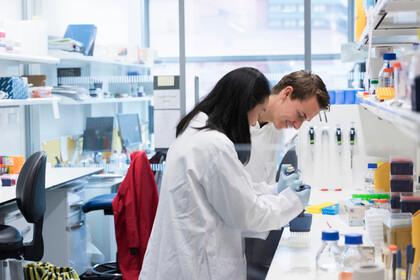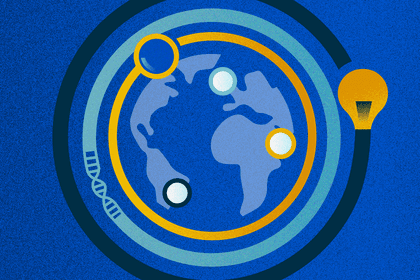
From cells to societies – £73m for transformative research environments to break down barriers
Wellcome is announcing £73 million in funding for eight new Discovery Research Platforms to help overcome barriers holding back progress across fields of research.
Discovery research has near limitless potential to transform our understanding of life, health and wellbeing, and improve people’s lives. But sometimes, researchers are faced with barriers too substantial to overcome alone, which prevent the pursuit of exciting new discoveries in their field.
Wellcome is today announcing £73 million in funding for eight new Discovery Research Platforms to address a range of practical, technological and methodological barriers holding up progress across a wide array of fields. Overcoming these barriers will enable researchers to ask even more creative and boundary-defying questions.
Discovery Research Platforms will bring together researchers, teams and networks of collaborators to develop new tools, knowledge and capabilities, with the hope of accelerating progress for the benefit of the wider global research community.
Breaking down barriers to discovery research also relies on researchers being able to work in creative environments that include a diverse range of people and perspectives. Discovery Research Platforms will seek to deliver a positive and inclusive research culture, which provides conditions for researchers to conduct their best work.
Michael Dunn, Director of Discovery Research at Wellcome, said: “Discovery research is essential to advancing our ability to understand and improve health. But in addition to researchers’ bold and imaginative ideas, we know that new tools, methods and capabilities are also needed to unlock new avenues of research that can disrupt and transform the research landscape globally.”
The eight Discovery Research Platforms span a diverse range of fields and disciplines:
The Discovery Research Platform for Cell-Matrix Biology at the University of Manchester aims to address conceptual and technical barriers to improve understanding of how changes in the molecular networks surrounding cells leads to tissue decline, with the potential to positively impact chronic diseases including cancer and fibrosis.
The Discovery Research Platform for Medical Humanities at Durham University will empower humanities and social science researchers, experts by experience, and health, creative and voluntary sector professionals to co-develop new and experimental approaches to tackling health challenges, including mental health and health inequalities.
The Discovery Research Platform for Infection at the University of Cape Town aims to take on gaps in our knowledge that hold back understanding of the interaction between infection and non-communicable diseases, and strengthen capacity to enable locally led, high-quality research studies to reduce infection, especially from HIV-1 and tuberculosis.
The Discovery Research Platform for Transformative Inclusivity in Ethics and Humanities Research at the University of Oxford plans to develop new concepts, methods and tools that address issues of conflicting values in society, including real-time digital mapping of value disagreements and facilitating engagement with excluded voices and problems.
The Discovery Research Platform for Naturalistic Neuroimaging at University College London will create a unique facility with transformative imaging technology, novel experimental designs and innovative analytics, all dedicated to studying how the human brain engages with the real world, with the aim of providing new perspectives on the diagnosis and treatment of neurological and mental health conditions.
The Discovery Research Platform for Integrating Metabolic and Endocrine Science at the University of Cambridge aims to address practical barriers preventing data integration across metabolic and endocrine science, investigate how hormones control metabolic processes and how these can go wrong in disorders such as obesity, diabetes and cachexia, and create tools to facilitate global access to this data.
The Discovery Research Platform for Tissue Scale Biology at the University of Cambridge seeks to move stem cell biology to the tissue and organ scale of research, creating a new network of local and international researchers to enable strategies that capitalise on new in vitro models to develop better treatments for human patients.
The Discovery Research Platform for Hidden Cell Biology at the University of Edinburgh plans to develop new tools to discover and characterise understudied proteins, visualise protein assemblies within cells and record rare cellular events, potentially opening new avenues for research into uncharacterised diseases and drug resistance.
Wellcome has pledged to spend £16 billion over the next ten years to help solve some of the world’s most urgent health challenges. This includes supporting discovery research to provide researchers with the time, freedom and resources to take on challenging questions that improve our understanding of life, health and wellbeing.
Michael Dunn added: “As part of our commitment to fund curiosity-driven discovery research, we want to tackle some of the barriers and bottlenecks across fields which hold back progress and limit the ability of researchers to take on big, challenging questions. Discovery Research Platforms are a brand-new approach for Wellcome. By providing substantial support focused on specific research challenges, these environments have the potential to revolutionise fields and provide maximum possible benefit for researchers around the world. I am particularly excited that Discovery Research Platforms span such a wide range of disciplines, showcasing our increasingly inclusive approach to funding.”
Wellcome plans to convene all eight Discovery Research Platforms over the next year to encourage collaboration and the exchange of best practice between researchers and teams working in these environments.
Professor Angela Woods and Dr Ben Alderson-Day, Co-Directors of the Discovery Research Platform for Medical Humanities at Durham University, which represents Wellcome’s largest ever grant for humanities research, said: “The Discovery Research Platform for Medical Humanities will create space for experimentation and intellectual risk-taking, support networks globally, and revolutionize the capacity of the field. It will empower people living with challenging and highly complex health conditions – many of which correlate with health inequalities – to take leading roles in the design and delivery of interdisciplinary and cross-sector health research.”
Professor Martina Callaghan, Director of the Discovery Research Platform for Naturalistic Neuroimaging at University College London, said: “We are excited to establish our Discovery Research Platform for Naturalistic Neuroimaging. It aims to overcome barriers in the field of neuroscience by providing the tools needed to better understand how the brain processes information as people engage with the real world. Ultimately we hope this will aid the development of more effective treatments for neurological and mental health conditions. We are eager to see the groundbreaking research and new discoveries that will emerge, and thank Wellcome for creating this wonderful opportunity. Establishing this Platform is a truly collaborative effort, and I want to extend my deepest thanks to all colleagues involved.”
Discovery Research Platforms are a part of Wellcome’s long-standing and enthusiastic commitment to funding fundamental science that shapes the world around us.

